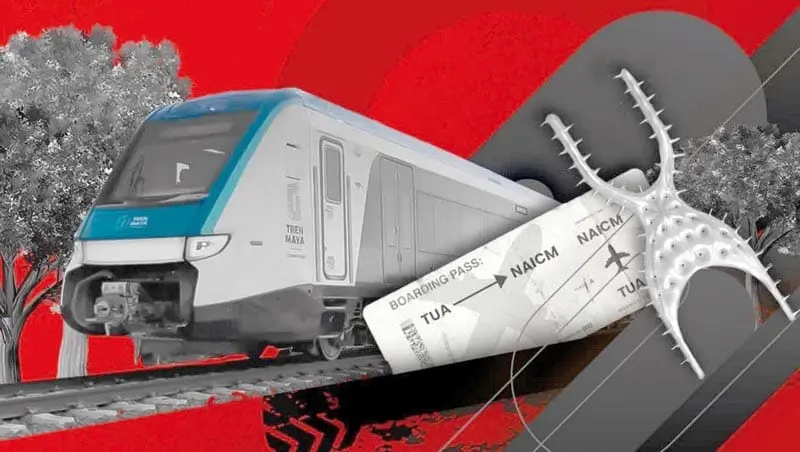The diversion of the diversion: Mexico City Airport passengers are paying for the Tren Maya construction works.
This is the second installment of the story we published yesterday about how the 1.2 billion dollars that should have been allocated to liquidate part of the debt caused by the cancellation of the Texcoco airport, ended up inexplicably financing the controversial Tren Maya project.
At the end of 2019, the Development Trust of the Mexico City Airport Group (GACM) for the construction of the Texcoco airport still had 1.2 billion dollars in cash, despite the cancellation of the work by the decision of President Andrés Manuel Lopez Obrador.
The 1.2 billion dollars obtained by the GACM through the issuance of private bonds to finance the construction of the New Mexico City Airport (NAIM). Once the works were canceled, there was a legal obligation to allocate those funds to liquidate those same bonds.
However, that amount, equivalent to 21 billion pesos, had another destination: it was diverted – without any justification – to contribute to the financing of the Tren Maya, another of the emblematic works of the current government.
This is the story of a double diversion documented after exposing the irregular use of the Airport Use Fees (TUA) paid by passengers at the Mexico City International Airport (AICM), to cover the debt of 4.2 billion dollars plus interest who left NAIM.
Through the TUAs, today AICM users finance – indirectly – part of the Tren Maya works, even though the legal destination of said resources should be to operate and provide maintenance and security to the capital’s airport.

In an interview, Javier Jiménez Espriú, former Secretary of Communications and Transportation, revealed that 1.2 billion dollars of the private resources that the GACM had obtained for the construction of the NAIM were used for the works of the Tren Maya.
“The Treasury takes 1.2 billion dollars from that trust and delivers it to the Mayan Train,” said Jiménez Espriú.
At the time of the cancellation of the Texcoco airport, the Ministry of Finance and Public Credit (SHCP) decided not to absorb the original debt of 6,000 million dollars, arguing that it was private debt as it had been contributed by investors through bonds.
However, two years later, it disposed of these resources as if they were public funds, leaving the debt in the hands of the AICM and its passengers. That is to say, those 1,200 million dollars were separated from their legal purpose, consummating a diversion scheme that, according to consulted specialists, could lead to processes sanctioned by the authorities involved.
“It wasn’t government money. These resources committed an operating company, which was the GACM,” declared Rogelio Rodriguez Garduño, constitutional lawyer expert in aeronautical law.
Those 1.2 billion dollars that were planned for the construction of the NAIM after the cancellation, had to be used to pay the investment bonds and reduce the outstanding debt. However, they were transferred to the Federation Treasury and were used to pay for part of the Tren Maya, according to the former head of the SCT.
Both Pablo Casas Lías, director of the National Institute of Legal-Aeronautical Research, and constitutional lawyer Rogelio Rodriguez agree that there is no legal basis to support said transfer.
The 1.2 billion dollars, which were transferred to the Federation Treasury (Tesofe) without apparent legal support, are today being 100% financed by AICM passengers through their TUAs.
In 2014, Development Trust 80726 was established as Nacional Financiera. Its objective was the acquisition of goods and contracting of services and public works, related to the planning, design, and construction of the NAIM.
The money that has been charged to passengers since 2020 to finance the maintenance and facilities of the capital airport has not only not been used for that legally established purpose, but is also being used to pay 1.2 billion dollars used in the construction of the Tren Maya.
The transaction violates Article 381 of the General Law of Credit Titles and Operations since the resources of Development Trust 80726 were used for purposes other than those “lawful and determined” in the trust contract.
The private resources of Trust 80726 had to be used to cover advance payments of the NAIM bonds, as had already been done with the previous $1.8 billion.
“In my opinion, it is a crime. The ultimate consequences must be reached because the Government abused the resources for the construction of the NAIM,” Marco Pérez Valtier, an economist and expert in public finances and fiscal issues, said in an interview.
The transfer of the 1.2 billion dollars would also violate Article 223 of the Federal Penal Code regarding the crime of embezzlement.
That is, both the officials of the Airport Group, as well as the public servants of the federal government who authorized and accepted the transfer of the 1.2 billion dollars, could be investigated for embezzlement for having diverted money whose only legal use was the construction of the NAIM and comply with the obligations of the GACM.
“Being public servants, all of them could have engaged in illicit conduct and acts and been subject to administrative and criminal responsibilities,” said Pablo Casas Lías.
The transfer and amount were confirmed by a former high-level official of the Mexico City Airport Group, who requested not to be identified, who told this media outlet that the order to move the money came directly from the Ministry of Finance. whose owner at that time was Arturo Herrera Gutiérrez.
San Miguel Times
Newsroom

